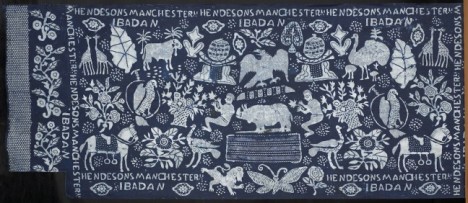Material World. Lucy Siegle at the Whitworth.
Susie StubbsOn the eve of a new exhibition at the Whitworth that explores our centuries-old appetite for clothes (and cotton), ethical writer Lucy Siegle tells us that fashion is wearing out the world.

It is a recent concept but one that appears unstoppable: the rise of ‘fast fashion’, that desire for cheap, new clothes that is best summed up by the rise and rise of arch discount chain Primark. It is a subject close to Observer ethical columnist Lucy Siegle’s heart. A reformed fashion addict, she understands the burning desire to stay on trend. “I used to be a prolific fashion consumer,” she says. “I bought into the idea of fast fashion completely and this wasn’t unusual among my generation. I lived through 15 years of economic growth, had a relatively high income – and a lot of that income went straight to Topshop.”
 Whatever her fashionable past, Siegle now argues that there is no getting away from the social, environmental and economic cost of disposable fashion, and she sets out these costs in unflinching detail in her book, To Die For: Is Fashion Wearing Out the World? And rather than provide a neat list of things that the fashion-lover can do to improve the credentials of their latest fashion fix, Siegle instead sets a challenge: change the way you think. Here, she gives some practical advice on how to start shopping and dressing ethically.
Whatever her fashionable past, Siegle now argues that there is no getting away from the social, environmental and economic cost of disposable fashion, and she sets out these costs in unflinching detail in her book, To Die For: Is Fashion Wearing Out the World? And rather than provide a neat list of things that the fashion-lover can do to improve the credentials of their latest fashion fix, Siegle instead sets a challenge: change the way you think. Here, she gives some practical advice on how to start shopping and dressing ethically.
A practical guide to looking good while acting green
Fashion itself isn’t necessarily a bad thing… “Ethical fashion isn’t about fashion-haters or crystal-wearing, carrot munchers,” says Siegle. There is nothing wrong with looking great, as long as you can do so with a clear conscience.
…But you need to re-think it. “Don’t try and replace one pattern of behaviour with another. Mass consumerism has taught us to be passive consumers. We have to change the way we think rather than just look for replacements.”
Find alternatives. “You don’t have to consume fashion to enjoy it. You don’t have to buy a knock-off version of everything you see on the catwalk.” Siegle points to innovative schemes such as Remade in Leeds, or using accessories and make-up to update your look instead of heading straight to Primark.
Embrace hard times. “The recession is having an impact. People are holding on to garments for longer, and so they are changing the way they buy them. They are buying with longevity in mind.”
Do your mam proud. “Look after your clothes. Wash them properly. Care for them and they’ll last longer. It sounds obvious but not everyone does it.”
And act like your gran. “Look at the quality of the fibre. The public does not understand how important fibres are in relation to how long a fabric will last – some last far longer than others. I use my hands a lot more. I’m like an old lady in a charity shop, looking at the seams, holding a garment to the light. It’s like if you bought a melon. You’d give it a quick sniff and a poke before you bought it. It’s the same with clothes.”
Lucy Siegle appears at the Whitworth on Friday 24 February (6.30pm) as part of the Creative Tourist Boutique Weekender. Tickets to this talk are free but booking essential. COTTON: Global Threads runs 11 February-13 May at the Whitworth. Free.

Words: Susie Stubbs. Images (top to bottom): Lubaina Himid-laughterbuckets, courtesy the artist/Whitworth Art Gallery; Lucy Siegle; Stencilled adire cotton, Nigeria, 1900-25, courtesy Whitworth Art Gallery.


















